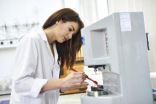(Press-News.org) ATLANTA–A chimpanzee's intelligence is largely determined by its genes, while environmental factors may be less important than scientists previously thought, according to a Georgia State University research study.
The study found that some, but not all, cognitive, or mental, abilities, in chimpanzees depend significantly on the genes they inherit. The findings are reported in the latest issue of Current Biology.
"Intelligence runs in families," said Dr. William Hopkins, professor in the Center for Behavioral Neuroscience at Georgia State and research scientist in the Yerkes National Primate Research Center at Emory University. "The suggestion here is that genes play a really important role in their performance on tasks while non-genetic factors didn't seem to explain a lot. So that's new."
The role of genes in human intelligence or IQ has been studied for years, but Hopkins' study is among the first to address heritability in cognitive abilities in nonhuman primates. Studies have shown that human intelligence is inherited through genes, but social and environmental factors, such as formal education and socioeconomic status, also play a role and are somewhat confounded with genetic factors. Chimpanzees, which are highly intelligent and genetically similar to humans, do not have these additional socio-cultural influences.
"Chimps offer a really simple way of thinking about how genes might influence intelligence without, in essence, the baggage of these other mechanisms that are confounded with genes in research on human intelligence," Hopkins said.
The study involved 99 chimpanzees, ranging in age from 9 to 54, who completed 13 cognitive tasks designed to test a variety of abilities. Hopkins used quantitative genetics analysis to link the degree of relatedness between the chimpanzees to their similarities or differences in performance on the various cognitive measures to determine whether cognitive performance is inherited in chimpanzees.
Genes were found to play a role in overall cognitive abilities, as well as the performance on tasks in several categories.
Traditionally, researchers studying animal intelligence or animal learning have shared the view that environment and how previous behavior is reinforced affect how animals perform on a particular task.
"In our case, at least, it suggests that purely environmental explanations don't really seem to tell the whole story," Hopkins said. "Genes matter as well."
Hopkins also studied the structure of chimpanzee intelligence to determine whether there were any similarities to the structure of human intelligence.
"We wanted to see if we gave a sample of chimpanzees a large array of tasks," he said, "would we find essentially some organization in their abilities that made sense. The bottom line is that chimp intelligence looks somewhat like the structure of human intelligence."
In the future, Hopkins wants to continue the study with an expanded sample size. He would also like to pursue studies to determine which genes are involved in intelligence and various cognitive abilities as well as how genes are linked to variation in the organization of the brain.
Hopkins also would like to determine which genes changed in human evolution that allowed humans to have such advanced intelligence.
INFORMATION:
Chimpanzee intelligence determined by genes
2014-07-10
ELSE PRESS RELEASES FROM THIS DATE:
Climate change may bring more kidney stones
2014-07-10
As daily temperatures increase, so does the number of patients seeking treatment for kidney stones. In a study that may both reflect and foretell a warming planet's impact on human health, a research team found a link between hot days and kidney stones in 60,000 patients in several U.S. cities with varying climates.
"We found that as daily temperatures rise, there is a rapid increase in the probability of patients presenting over the next 20 days with kidney stones," said study leader Gregory E. Tasian, M.D., M.Sc., M.S.C.E., a pediatric urologist and epidemiologist at ...
In the gut, immunity is a 2-way street
2014-07-10
In recent years, it has become increasingly clear that many diseases are triggered or maintained by changes in bacterial communities in the gut. However, the general view up into now has been rather simple: bacteria stimulate the immune system, leading to inflammation or autoimmune disorders in a single direction.
Now, in work published in Immunity, scientists led by Sidonia Fagarasan from the RIKEN Center for Integrative Medical Science in Japan have painted a more complex picture: the gut immune system does not simply prevent the influx of pathogens, but is actively ...
Sleep disturbances, common in Parkinson's disease, can be early indicator of disease onset
2014-07-10
Amsterdam, NL, 10 July 2014 – Up to 70% of Parkinson's disease (PD) patients experience sleep problems that negatively impact their quality of life. Some patients have disturbed sleep/wake patterns such as difficulty falling asleep or staying asleep, while other patients may be subject to sudden and involuntary daytime sleep "attacks." In the extreme, PD patients may exhibit REM-sleep behavior disorder (RBD), characterized by vivid, violent dreams or dream re-enactment, even before motor symptoms appear. A review in the Journal of Parkinson's Disease discusses the underlying ...
Rice's silicon oxide memories catch manufacturers' eye
2014-07-10
Rice University's breakthrough silicon oxide technology for high-density, next-generation computer memory is one step closer to mass production, thanks to a refinement that will allow manufacturers to fabricate devices at room temperature with conventional production methods.
First discovered five years ago, Rice's silicon oxide memories are a type of two-terminal, "resistive random-access memory" (RRAM) technology. In a new paper available online in the American Chemical Society journal Nano Letters, a Rice team led by chemist James Tour compared its RRAM technology ...
Mayo Clinic calls for standardization of safe imaging protocols for children
2014-07-10
ROCHESTER, Minn. — The benefits of medical imaging far outweigh the risks when children receive The Right Exam, ordered The Right Way, with The Right Radiation Dose. However, overuse and misuse of imaging change the benefit-risk ratio and Mayo Clinic is leading a collaborative effort to ensure a national protocol is put into action. The commentary, published online in the Journal of Patient Safety, calls for the American College of Radiology, the Joint Commission, the Intersociety Accreditation Commission, and the Centers for Medicare & Medicaid Services to require three ...
NOAA's GOES-West satellite sees smoke from Canadian fires over US
2014-07-10
NOAA's Geostationary Operational Environmental Satellite or GOES-West satellite spotted smoke over the U.S. Mid-West from dozens of fires raging in Canada's Northwestern Territories.
At 1200 UTC (8 a.m. EDT) on July 9, 2014, GOES-West captured this image of the brownish-colored haze created by forest fires in Canada's Northwest Territories that drifted all the way into South Dakota. This image was created by the NASA GOES Project at NASA Goddard Space Flight Center, Greenbelt, Md.
According to Canada's Natural Resources, Canadian Wildland Fire Information System, fire ...
NASA sees Tropical Storm Neoguri losing punch along southern Japan's coast
2014-07-10
Once a powerful super typhoon, now an weakening tropical storm, NASA's Terra satellite saw a much weaker Tropical Storm Neoguri moving along the southern coast of Japan.
On July 10 at 0:35 UTC, the Moderate Resolution Imaging Spectroradometer (MODIS) instrument aboard NASA's Terra satellite captured an image of a more disorganized Tropical Storm Neoguri over east central Japan. At the time of the image, a more elongated Tropical Storm Neoguri's center was east of Kyushu, Japan.
A visible image from the Visible Infrared Imaging Radiometer Suite (VIIRS) instrument aboard ...
Sun-like stars reveal their ages
2014-07-10
Defining what makes a star "Sun-like" is as difficult as defining what makes a planet "Earth-like." A solar twin should have a temperature, mass, and spectral type similar to our Sun. We also would expect it to be about 4.5 billion years old. However, it is notoriously difficult to measure a star's age so astronomers usually ignore age when deciding if a star counts as "Sun-like."
A new technique for measuring the age of a star using its spin - gyrochronology - is coming into its own. Today astronomers are presenting the gyrochronological ages of 22 Sun-like stars. Before ...
World interest in research work on the benefits of the Okra plant
2014-07-10
Estonian-born Katerina Alba's research at the University of Huddersfield could help to improve the quality of some of the most popular emulsion-based food products – such as butter, mayonnaise, yoghurt and fruit drinks – and she is starting to gain an international profile for her work.
Katerina gained her MSc degree in nutrition and food science at the University and now she has embarked on research for a PhD. Working with her supervisor, Dr Vassilis Kontogiorgos, she is investigating the potential of carbohydrates extracted from the pods of the okra plant. They can ...
Understanding consciousness
2014-07-10
EVANSTON, Ill. --- Why does a relentless stream of subjective experiences normally fill your mind? Maybe that's just one of those mysteries that will always elude us.
Yet, research from Northwestern University suggests that consciousness lies well within the realm of scientific inquiry -- as impossible as that may currently seem. Although scientists have yet to agree on an objective measure to index consciousness, progress has been made with this agenda in several labs around the world.
"The debate about the neural basis of consciousness rages because there is no widely ...



